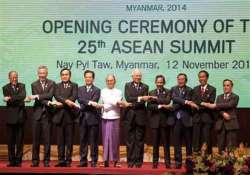A look at the top issues at Asian security meeting
Nay Pyi Taw, Myanmar: U.S. President Barack Obama and other world leaders gather in Myanmar this week for wide-ranging talks that will include everything from the intractable territorial dispute in the South China Sea to

Nay Pyi Taw, Myanmar: U.S. President Barack Obama and other world leaders gather in Myanmar this week for wide-ranging talks that will include everything from the intractable territorial dispute in the South China Sea to the deadly Ebola virus. While more than a 1,300 journalists descended on the sprawling, purpose-built capital, Naypyitaw, they are granted only superficial access, herded around at a safe distance from officials.
The meetings began Wednesday between presidents and prime ministers from Southeast Asia and will be expanded on Thursday to include leaders from the China, India, South Korea and Thailand among others. There are no planned news briefings—though that could change—and any interviews with officials need to be pre-approved with the Myanmar government and conducted in specified rooms.
Widely considered a talk shop—and for Washington a chance to show greater engagement in the region—no breakthroughs are expected. But here are some of the hot topics:
THE SOUTH CHINA SEA:
Territorial disputes in the South China Sea, which is of tremendous strategic importance to everyone, including Washington, will be one of the most talked about issues, but no breakthroughs are expected.
A third of the world's shipping transits through the contested sea, which is also rich with fish and is believed to have large oil and gas reserves under the seabed.
China—which claims most of the area—has stepped up naval patrols in recent months and temporarily positioned an oil rig in territory also claimed by Vietnam, sparking deadly anti-Chinese riots. Others claiming parts of the sea are the Philippines, Taiwan, Brunei and Malaysia.
EBOLA:
Although Asia has not had any confirmed Ebola cases, the region which has more than 60 percent of the world's population has become acutely aware of its vulnerability to the deadly virus.
More than 5,000 people have died, most of them in the West African nations of Liberia, Guinea and Sierra Leone. China and India are the top two destinations in Asia for travelers from the hardest-hit nations.
Asia has stepped up surveillance at airports and some countries are considering quarantine measures, but experts worry that the preparations may be insufficient and say the region should be doing more to join the global fight.